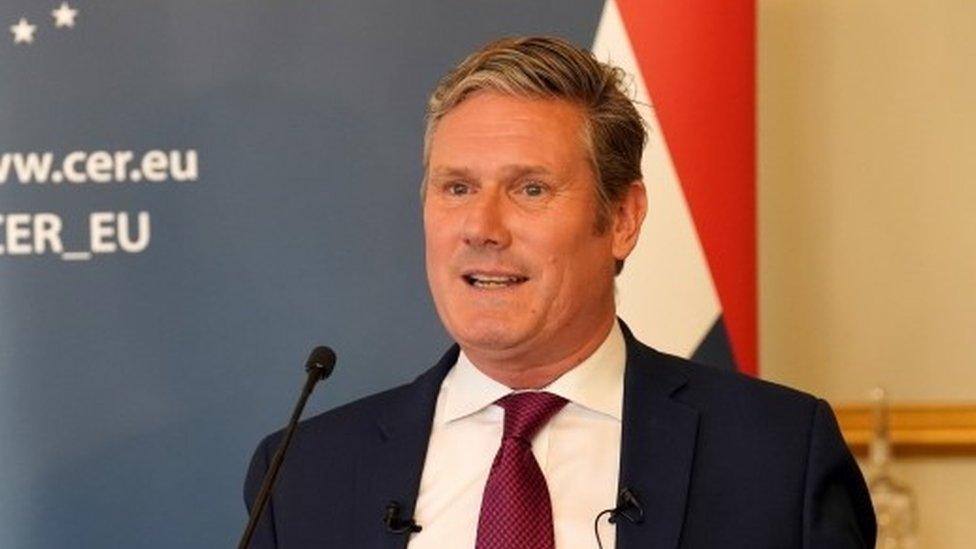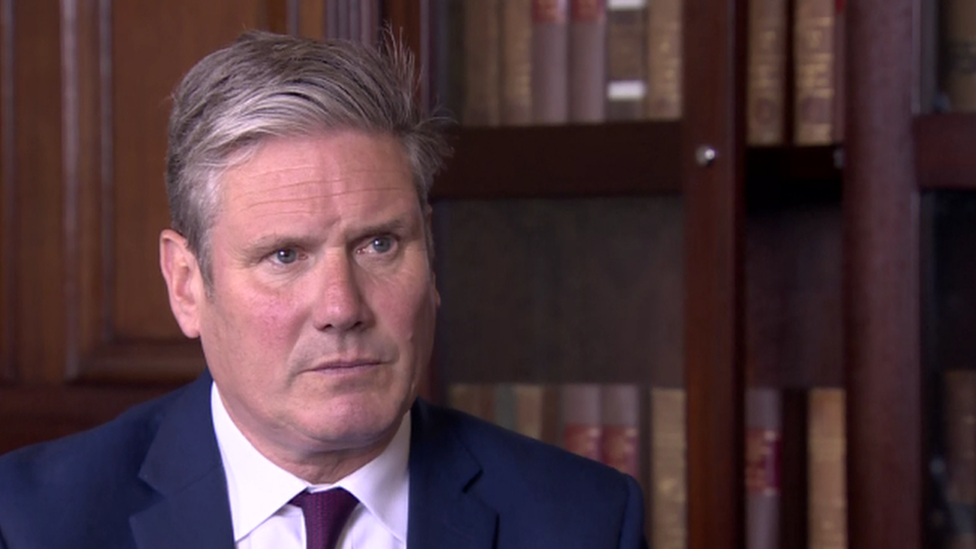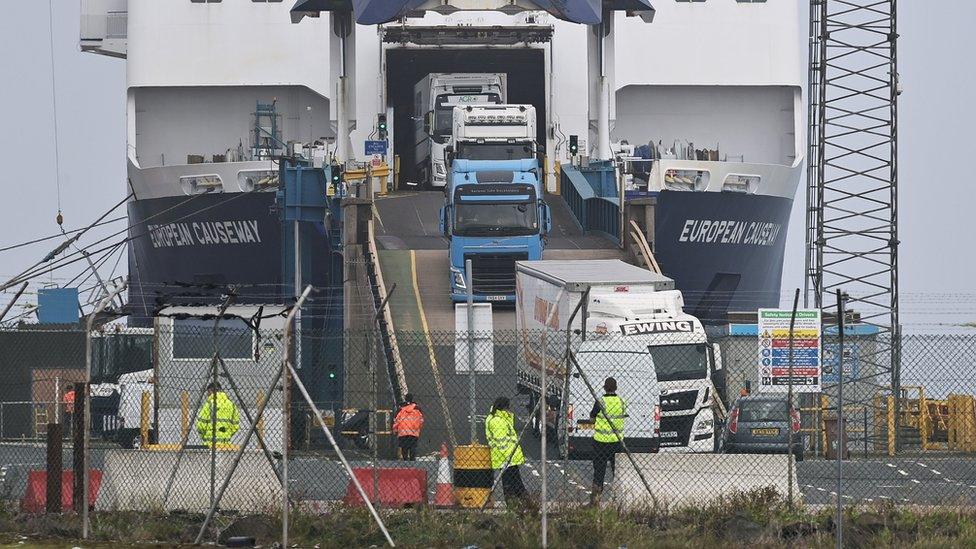Why Labour's leader has made peace with Brexit
- Published

Sir Keir Starmer has vowed to "make Brexit work"
The man who dreamed of overturning Brexit in a second referendum has categorically and clearly made peace with it.
It is one heck of an about-turn from Sir Keir Starmer, who just three years ago turned up at a rally for what was called a People's Vote - another referendum in which he hoped for a Remain victory.
Now, he says, as prime minister he wouldn't advocate rejoining the European Union, nor sign up to three of its biggest ideas: the single market, the customs union or freedom of movement.
In other words, Sir Keir is not just accepting Brexit, but what many critics liked to call a "hard Brexit", when arguing that staying in the EU or having a closer relationship with it was preferable to the government's vision.
So, why is he saying it?
It felt to me like he was fulfilling the advice once offered to former Prime Minister David Cameron by the elections strategist Lynton Crosby, to "get the barnacles off the boat".
In other words, deal with the stuff that gets in the way of what really matters.
What Sir Keir wants to focus on in the coming weeks and months is what he diagnoses as being at the root of so many of the country's problems - a lack of economic growth.
"Our driving mission is to get Britain's economy growing again," as he put it.
A moment for Labour
While the Labour leader has spelt out his new outlook on Brexit in more piecemeal fashion before, this speech at the Irish Embassy in London, and the interviews he did with the political editors of the BBC, ITV and Sky, still felt like a moment.
After the long-haul anguish and argument over Brexit, this was the leader of the only alternative main party of government at Westminster definitively accepting it and seeking to move on.
To nail, in a set of consecutive sentences that couldn't be interpreted any other way, that the fundamentals of the argument about Brexit, that has so dominated British political discussion for years and years, is, as far as he is concerned at least, over.
But it does raise a question about authenticity - what does he actually believe? What he said three years ago, or what he is saying now?
"We have left the EU now, and there is no going back," he told me in answer to this question - arguing that accepting these fundamentals would mean he could focus on what he sees as making Brexit work better, not least in Northern Ireland.
It's not a surprise all this has prompted a bit of internal squirming.
After all, this is a party where the vast majority of its members were passionate advocates of Remain, and deeply sceptical about Brexit.
Wooing Leave voters
The Mayor of London, Sadiq Khan, reiterated that rejoining the EU's single market, which aims to make trade between countries as easy as it is within them, would be worth it.
On the face of it too, you might imagine that given the Brexit referendum split 52% to 48% in favour of Leave, there might be plenty of opportunity for a party like Labour to do well out of appealing to those who voted Remain.
But, the Remain vote was concentrated in a small number of places, whereas the Leave vote was much more evenly distributed around the country.
So a large majority of constituencies voted Leave.
There are 632 constituencies in England, Scotland and Wales.
Of those, 403 of them voted Leave in the 2016 referendum, and 229 voted to Remain.
Only 72 Remain voting seats were won by the Conservatives, and Labour are the closest challengers in just 30 of those.
So Labour can't make much progress by appealing just to Remain-voting areas.
Things might be different if there had been a huge shift in opinion against Brexit since 2016.
But while there is polling evidence, external to suggest more people now say that, in hindsight, voting to leave the EU was the wrong decision than the right one, there is still a significant split - and so in plenty of constituencies staying out of the EU is still likely to be the favoured option.
Keir Starmer: We're not trading on divisions
It is different for the Scottish National Party, the Green Party and, to at least some extent, the Liberal Democrats.
For the SNP and the Greens, their best chances at the next general election will be in Remain-voting areas and they'll seek to capitalise on this.
The Green Party has already claimed Sir Keir's stance is "driven only by Labour's self-interest rather than the best interests of the country".
The Lib Dems will see Conservative-held, Remain-leaning seats as potentially rich pickings for them, although recent by-elections in Devon and Shropshire have shown they can win in Leave-leaning areas too.
But Labour's big challenge is winning seats currently held by the Conservatives, particularly those it lost for the first time in decades in 2019 where there was a solid Leave vote in 2016.
The party will hope that its unambiguous acceptance of Brexit will ensure it can get a hearing again, for what Sir Keir wants to set out next; his broader economic vision.
He just has to pray he will get that chance - because having promised to resign if he gets a fine for breaking Covid rules, he is still awaiting the decision of Durham police.
Related topics
- Published10 June 2022

- Published27 June 2022
